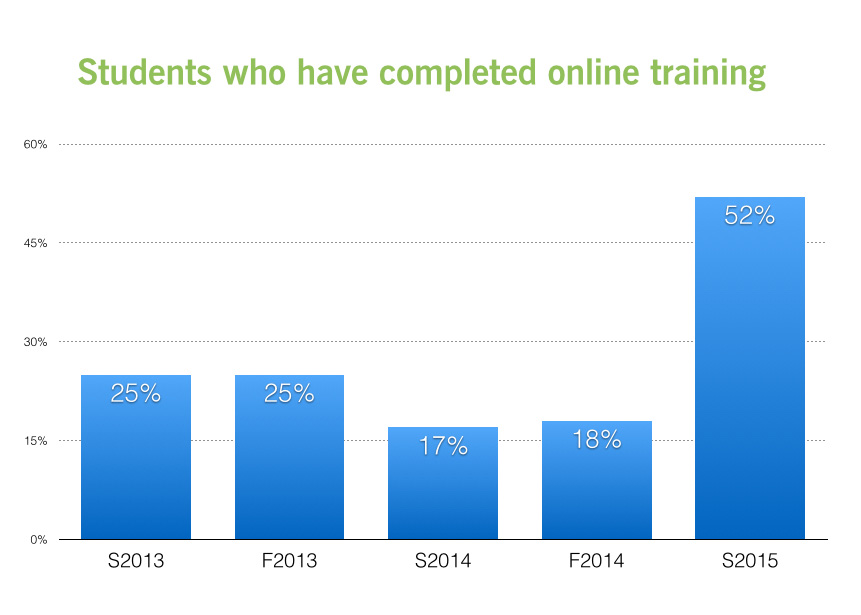
We introduced some significant changes to the Classroom Program in spring 2015. This term saw the largest number of classes yet, but most importantly, the term was a success in the quality of contributions and user experiences, too.
Our Classroom Program supports instructors who improve Wikipedia through student assignments. We offer students and instructors with training and materials necessary to contribute high quality work to Wikipedia.
In the spring, we supported 117 courses, more than ever before and up from 98 courses in the fall. While our course count is up, we supported about 500 fewer students as compared to our fall 2014 term. That’s because we made an effort to encourage smaller course sizes. That decision came from a review of our fall courses, where we saw that smaller class sizes led to better experiences and higher quality contributions.
That kind of learning, and others, were collected in our course onboarding checklist for the spring term. That checklist helps flag potential problems before instructors start planning a course that might run into trouble.
Along with that checklist, we also launched some technical tools that made it easier to support instructors and students alike. In particular, our course Dashboard and Assignment Design Wizard tools both launched during the spring 2015 term. The Dashboard gave instructors a simpler way to follow the work that their students do on Wikipedia. That includes seeing which students have finished the training and which have not. Those tools had a huge impact in one area tied to better contributions: we had a higher ratio of students complete the training for students this term (52%) over previous terms (spring 2014, 25% and fall 2014, 28%).

The Assignment Design Wizard ensured that all supported classes followed the best practices for teaching with Wikipedia by integrating these practices into their lesson plan timelines. All of these tools and resources led to a term with no significant incidents within the Wikipedia community, and the creation of 409 new articles and contributions to almost 3,500 more.
Though our new tools made for a successful term, the ongoing commitment of our staff cannot be understated. After busily onboarding classes for the term, I went on maternity leave and successfully handed over the program to Ryan McGrady, now our Community Engagement Manager. The transition was a smooth one, and preliminary results from our instructor survey indicate that 91 percent of instructors found Ryan and I to be very helpful in running their Wikipedia assignments. Similarly, Ian and Adam, our Wikipedia Content Experts, worked carefully to provide timely and meaningful feedback to all of their students.
This term showed us that we can maintain or excel in the quality of student work even when taking on more courses. They also show a promising result from a suite of tools that we’re constantly improving.
For the fall 2015 term, we are launching an entirely new course page system that will enable us to support more classes, and ensure that these classes contribute high quality work to Wikipedia!
Helaine Blumenthal
Classroom Program Manager

I have been following the Wikipedia Education Foundation and their various programs especially those that were executed in 2014 and the ones proposed for the upcoming years. I am so thrilled about the progress that have been chalked with respect to the project. I however realize that in terms of diversity there is so much to be achieved. Most of the projects are for Universities and Institutions in the United States and Canada. I wanted to know if they are only restricted to those regions and if not are there any plans to extend these projects to the global South?
Hi Raphael, The Wikimedia Foundation supports education efforts outside of the USA and Canada, and in many languages.
You can find more information about that here: https://outreach.wikimedia.org/wiki/Education